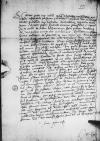Credere potes me nihil operae diligentiaeque omisisse, quo meum assequerer plus quam parentem. Quarto die ab incepto itinere prehendi iam lassatum itineratione, vegetum tamen ⌊senem⌋. Mirari possis, quantis omnium plausibus excipiatur. In ⌊eo⌋ omnem et totam ⌊Hispaniarum⌋ spem positam locatamque esse uno passim omnes ore conclamant. Equidem misereor huius candoris eo provecti, ut non desint, qui illius prudentiae, cum alias nequeant, hoc modo detrahant tamquam meis ille consiliis iter hoc inchoarit. Sed ego quidem facile patiar
cf. Ter. Eu. 381 At enim istaec in me cudetur faba ⌊hanc in me fabam coniectam essecf. Ter. Eu. 381 At enim istaec in me cudetur faba ⌋, quippe qui adversus tales insultus animo sum plus quam intrepido.
⌊Vicecancellarius⌋, quem semper habuit, tandem animum explicavit. Mirabere et hoc, quanto ⌊ille⌋ apparatu ostentationeque hactenus occultarit virus id, virulentissimus homo. Dabitur id saeculo huic saneque infelici. ⌊Lalmant⌋ apud ⌊caesarem⌋ instetit, ut ait, pro revocatione, sed extra animum, neque adimplebit autem cupiditatem hanc malam. Nescio ominari successum harum rerum, adeo mihi videntur mirabiles.
Italiae passim multa [T] facturum, modo ⌊caesari⌋ visum ita fuerit. Sunt et istic, qui res regis Angliae strenue agunt, sed, ut audio, minime successuris conatibus. ⌊Pontifex⌋
fertur praeclara quaedam adversus ⌊viceregem⌋ gessisse. Nescio, an vobis id quoque constet.
⌊Caesarea est Augusta⌋ ad ⌊Hiberum⌋ flumen, quae nos humanissime excepit. Iam ad loca ea pervenimus, in quibus olim ⌊Caesar⌋ ⌊Petreium⌋, ⌊Afranium⌋ et ⌊Marcum Varronem⌋, ⌊Pompeii⌋ duces, sibi in potestatem redegit,[9] inter ⌊Sincam⌋ scilicet et ⌊Sycorim⌋ satis celebrem ⌊Lucani⌋ etiam ⌊⌋, tribus tantum leucis ab ⌊Ilerda⌋. ⌊Quo⌋ postquam pervenerimus, videbis me copiosius scripturum esse, quandoquidem diem illic Palmarum[10] celebrabimus. Tu interea scribe ad me, quae facies rerum sit ⌊istic⌋. Plurimum enim id ego scire desidero. Commendabis autem me imprimis tibi, deinde illustri domino ⌊comiti⌋ et magnificis dominis comitibus palatinis,[11] confratribus meis, quos omnes iubeo tecum rectissime valere.
[9 ] The Battle of Illerda (49 BC) was a series of military actions near Illerda (now Lleida/Lerida) in the Civil War between Caesar and Pompey. It resulted in the surrender of Lucius Afranius and Marcus Petreius, the commanders of Pompey’s army, to Caesar, and thereafter, the surrender of Marcus Terentius Varro, praetor of Hispania Ulterior
[10 ] In 1527 Palm Sunday fell on April 14
[11 ] To be added later: which of the counts palatine were at the court of Charles V at that time

